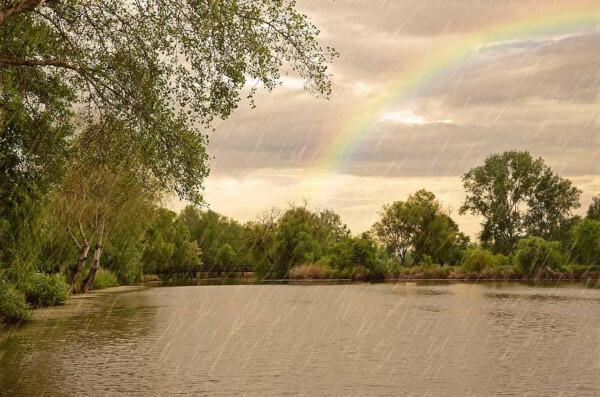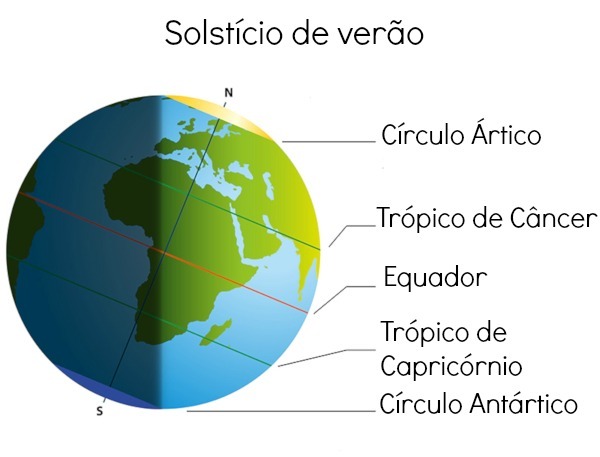O summer, one of the four seasons of the year, succeeds the spring and precedes the autumn. Its main features are the high temperatures and the increase in rainfall.
Read too:What is daylight saving time?
Meaning of the word summer
The word summer originated from the Vulgar Latin veranum tempus, which means spring time.
Summer Features
Summer is characterized by increased temperatures and rainfall. Normally, in this season, the days are longer than the nights due to the greater solar incidence in one of the hemispheres.
At this time, sudden changes in weather can be observed, with rapid duration rains, known as summer or convective rains. Despite being fast, they are usually intense and usually happen in the late afternoon, when water evaporation rates (rivers, lakes, seas) are at their highest.

During the summer, the occurrence of short duration and heavy rains is common.
Summer start and end dates
North hemisphere |
In the Northern Hemisphere, summer begins with the summer solstice, between the 20th and 21st of June. Its completion takes place between the 22nd and 23rd of September.
South hemisphere |
In the Southern Hemisphere, summer begins with the summer solstice, between December 20th and 21st. Its completion takes place between the 20th and 21st of March.

In the Northern and Southern Hemispheres, summer begins in June and December, respectively.
Summer in Brazil – 2018 and 2019
2018
Summer begins on December 21, 2018, at 7:23 pm, and ends on March 20, 2019, at 6:58 pm.
2019
Summer begins on December 22, 2019, at 1:19 am, and ends on March 20, 2020, at 12:50 am.
Mind Map: Seasons of the Year

*To download the mind map in PDF, Click here!
DST
Daylight saving time starts in spring and lasts until the end of summer and consists of moving the clock forward by one hour. By bringing the time forward, the availability of natural light during the day is increased, leading to electricity rationing. At the end of daylight saving time, clocks must be set back by one hour, so at midnight the clocks reset to 23:00.
Daylight saving time currently exists in 30 countries. In Brazil, this time was created through the decree of Law nº 20,466, on October 1st, 1931. At that time, every state in the country moved their clocks forward by one hour.
→ Summer time in Brazil
On April 24, 2019, President Jair Bolsonaro signed a decree repealing daylight saving time. Since then, the practice of setting the clocks ahead by one hour during the summer months has ended throughout the country.
Summer Solstice
Solsticeis an astronomical phenomenon in which the Sun has a greater declination in latitude in relation to the Equator. The moment when one of the hemispheres receives greater solar incidence is called the summer solstice, which inaugurates this season of the year.
When the summer solstice occurs in the Southern Hemisphere, the Sun falls perpendicularly on the Tropic of Capricorn. When the summer solstice occurs in the Northern Hemisphere, the solar incidence is perpendicular to the Tropic of Cancer.

On the summer solstice, there is greater solar incidence in one of the hemispheres.
Know more: Solstice and Equinox, what are they?
Why are there seasons?
The seasons result from the translation movement of the Earth, that is, its occurrence is related to the inclination of the Earth in relation to the Sun. As the planet rotates around this star, the two hemispheres receive different solar incidences, giving rise to the four seasons of the year: spring, autumn, summer and winter.
Curiosities
→ In the Northern Hemisphere, summer is called northern summer. In the Southern Hemisphere, it is called the austral summer.
→ In summer, days are longer than nights.
→ The first day of summer is called the summer solstice, which means "still sun" in Latin.
→ Some experts claim that exposure to solar radiation stimulates the production of dopamine, melatonin and serotonin, giving people a feeling of greater joy.
→ The Eiffel Tower in Paris increases its height by 15 cm during the summer months as a result of the expansion process suffered by iron in the heat.
→ Summer is normally considered a vacation period. Many people travel at this time of year. The beaches are one of the most popular places for those who want to enjoy the high temperatures that season.
Read too: summer food
By Rafaela Sousa
Graduated in Geography

